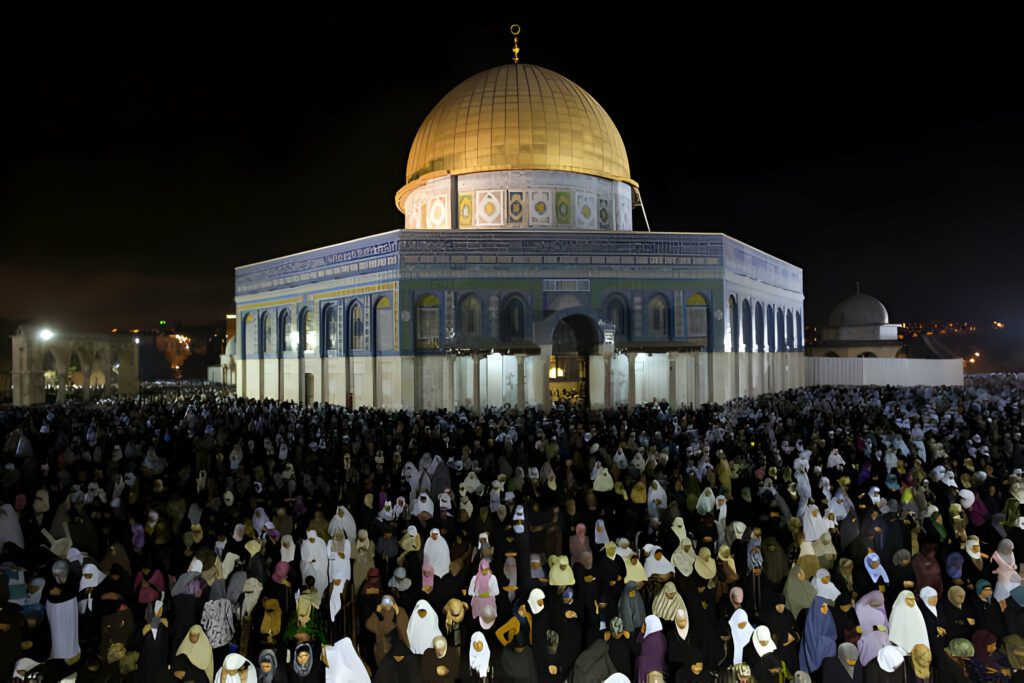In the Islamic calendar, Sha’ban holds a night of profound significance and blessings. This night, positioned at the midpoint of Sha’ban, is distinguished by the divine display of forgiveness and mercy from Allah. It is a time when Allah extends forgiveness to those who seek it and showers mercy upon those who request it. Furthermore, during this sacred night, the prayers of the devout are answered, relief is provided to those in distress, and many are liberated from the punishments of the Fire. This occasion also marks the moment when provisions and deeds are recorded.
The importance of this night is underscored by numerous Hadiths. While it’s noted that the Hadiths concerning this night are not without their weaknesses, including interrupted chains of transmission, their significance is undiminished. Some of these Hadiths carry minor flaws, yet their value in illustrating the night’s virtue remains intact. Notably, Hafiz Ibn Hibban has recognized some of these Hadiths as authentic, affirming their contribution to understanding the night’s profound impact.
Among the narrations, several stand out for their mention of this night’s exceptional nature.
“It is its middle night, in which Allah manifests the entirety of His forgiveness and His all-encompassing mercy. Thus, He forgives those who seek forgiveness and has mercy on those who seek mercy. He also answers the pleas of the supplicants, grants relief to the afflicted, and frees a great number from the Fire. In addition, sustenance and actions are recorded in it.”
This excerpt encapsulates the essence of the night’s spiritual significance and the comprehensive benevolence bestowed upon the faithful during these sacred hours.
Despite the discussions surrounding the authenticity of the Hadiths related to this night, the consensus among scholars, including the endorsement by Hafiz Ibn Hibban, emphasizes its spiritual importance. The night serves as a beacon of hope and renewal for believers, encouraging them to engage in acts of worship, seek forgiveness, and aspire for divine mercy.
The collective remembrance and observance of this night underscore the enduring relevance of these teachings. They offer a moment for reflection, spiritual growth, and a renewed commitment to the path of righteousness, illustrating the enduring impact of this night on the faithful’s lives.
Hadith about the Middle Night of Sha’ban
Al-Tabarani and Ibn Hibban narrated that Mu’adh b. Jabal رضي الله عنه said that the Prophet ﷺ said,
“Allah looks at all His creation on the middle night of Sha’ban. He forgives all people, except the polytheist or the mushahin (bickerer).”
A mushahin is an evil hypocrite who causes division and stokes the flames of enmity between two people who love each other.
Ibn al-Athir said in his Nihayah,
“Al-Mushahin is an antagonistic person. Shana’ is enmity.”
Al-Bayhaqi narrated a Hadith from Sayyidah ‘A’ishah رضي الله عنها that the Messenger of Allah ﷺ said,
“Jibril عليه السلام came to me and said, ‘This is the middle night of Sha’ban. In it, Allah frees as many people as the livestock of Banu Kalb have hairs. However, in it, Allah will not look at the polytheist, the bickerer, the cutter of family ties, the one who lets his garment hang down below his ankles (out of arrogance), the one who mistreats his parents, nor the one addicted to wine…’”
Al-Bayhaqi mentioned this as part of a longer Hadith, which he narrated completely.
Imam Ahmad narrated from Abdullah ibn ‘Umar (may Allah be pleased with father and son) that the Messenger of Allah ﷺ said,
“Allah (Mighty and Majestic is He) looks at all His creation on the middle night of Sha’ban. He forgives them all, except two: the bickerer and the murderer.”
Its chain of transmission is somewhat weak, just as al-Hafiz al-Mundhiri said.
Al-Tirmidhi and Ibn Majah narrated that Sayyidah ‘A’ishah رضي الله عنها said,
“I missed the Prophet ﷺ. So, I went out looking for him. He was in Baqi’, raising his head to the sky.
“He said, ‘Did you believe that Allah and His Messenger would be unjust to you?’
“I replied, ‘I thought that you had visited one of your wives.’
“He said, ‘Indeed, Allah (Blessed and Exalted is He) descends, on the middle night of Sha’ban, to the lowest heaven. He forgives more people than there are hairs on the livestock of Banu Kalb.’”
Al-Tirmidhi said, “We only know this Hadith of ‘A’ishah by way of this chain of transmission. I heard Muhammad [meaning al-Bukhari] declaring this Hadith to be weak because it is interrupted in two places.”
Ibn Majah narrated that Abu Musa al-Ash’ari said that the Messenger of Allah ﷺ said,
“Indeed, Allah looks [at His creation] on the middle night of Sha’ban. He forgives all His creation, except a polytheist or a bickerer.”
This is a narration from Ibn Lahi’ah, who had been weakened by some people. He (Ibn Lahi’ah) narrates from al-Dahhak from Ayman al-Kalbi. Al-Dhahabi said about the latter, “No one knows who he is.”
Al-Tabarani and al-Bayhaqi narrated by way of Makhul, from Abu Tah’labah al-Khushani رضي الله عنه that the Prophet ﷺ said,
“Allah looks at His servants on the middle night of Sha’ban. He forgives the believers, is lenient with the disbelievers, but leaves people who are bitter to their bitterness until they abandon it.”
This means that He does not forgive them or grant them respite until they leave their bitterness. Al-Bayhaqi said, “There is a disconnect between Makhul and Abu Tha’labah, but it is a satisfactory mursal Hadith.”
Al-Bazzar and al-Bayhaqi both narrated from Abu Bakr al-Siddiq رضي الله عنه that the Prophet ﷺ said,
“Allah descends to the lowest heaven on the middle night of Sha’ban. He forgives everyone except a polytheist or a man who holds rancor in his heart.”
There is no problem with its isnad, just as al-Hafiz al-Mundhiri has mentioned.
Al-Bayhaqi narrated, with a weak chain of transmission, from ‘Uthman b. Abi al-‘As رضي الله عنه, that the Prophet ﷺ said,
“When the middle night of Sha’ban occurs, a caller calls out, ‘Is there anyone who is seeking forgiveness that I may forgive him? Is there anyone making a request, that I may grant it to him?’ Thus, no one will ask him for anything on that night, except that he will be given it, except a fornicator or a polytheist.”
That is how it was narrated in the narration of al-Bayhaqi. In another narration, this has been narrated regarding every night of the year, and it was not specifically tied to the middle night.
In al-Musnad [of Imam Ahmad], al-Hasan al-Basri (may Allah be pleased with him) is narrated to have said,
“’Uthman b. Abi al-‘As رضي الله عنه passed by Kilab b. Umayyah, while the latter was sitting in the gathering of tax collectors. He replied to him, ‘Why are you sitting here?’
“He said, ‘Such and such ruler [meaning Ziyad] has placed me in charge of this.’
“He [‘Uthman] رضي الله عنه asked him, ‘Would you like me to narrate to you something I heard from the Messenger of Allah ﷺ?’
“He [Kilab] said, ‘Certainly.’
“He [‘Uthman] رضي الله عنه said, ‘I heard the Messenger of Allah ﷺ say, “The Prophet of Allah, Dawud عليه السلام, had an appointed hour of the night in which he would wake his people and say, ‘O, family of Dawud! Stand and pray. For this is the hour in which Allah will answer all supplications, except that of a sorcerer or a tax collector.’”’ So, Kilab b. Umayyah embarked on his ship and went straight to Ziyad. He requested to be relieved, so he relieved him.”
Al-Tabarani narrated a similar Hadith in “al-Kabir” and “al-Awsat” with the wording,
“The Prophet ﷺ said, ‘The gates of heaven are opened in the middle of the night. A caller says, “Is there anyone supplicating that I may answer him? Is there anyone requesting something that I may grant it to him. Is there anyone in distress that I may grant him relief?” So, no Muslim supplicates for anything, except that Allah will grant it to him, except a fornicator that persists in his fornication or a tax collector.’”
As should be evident, there is no contradiction between these narrations, because the middle night is included in the general meaning of the narration of Ahmad and al-Tabarani.
Al-Bayhaqi narrated from Makhul from Kathir b. Murrah- a Tabi’I- that the Prophet ﷺ said,
“On the middle night of Sha’ban, Allah forgives all the people of the Earth, except a polytheist and a bickerer.”
Al-Bayhaqi said, “This is an acceptable mursal Hadith.”
Al-Bayhaqi also narrated from ‘Ala b. al-Harith that Sayyidah ‘A’ishah رضي الله عنها said,
“The Messenger of Allah ﷺ stood at night in prayer. He lengthened his prostration until I believed that he had passed away. When I thought that, I got up and moved his index finger. He in turn moved it. So, I returned. When he raised his head from prostration and finished his prayer, he said, ‘O, ‘A’ishah! O, white one! Did you believe that I had broken my promise to you?’
“I replied, ‘No, by Allah, o, Messenger of Allah! Rather, I believed that you had passed away due to the lengthiness of your prostration.’
“He ﷺ asked, ‘Do you know which night this is?’
“I said, ‘Allah and His Messenger know best.’
“He ﷺ said, ‘This is the middle night of Sha’ban. Allah (Mighty and Majestic is He) looks at his servants on the middle night in Sha’ban. He forgives everyone who asks forgiveness, shows mercy to those who ask for mercy, but leaves the bitter people alone in their state.’”
Al-Bayhaqi said, “This is a satisfactory mursal Hadith. However, it is possible that al-‘Ala heard this Hadith from Makhul.”
Prescribed Prayers During the Night of Sha’ban
In exploring the spiritual practices associated with the 15th of Sha’ban, it emerges from various narrations that the specific prayers prescribed for this night—such as the performance of fourteen raka’at—rest on foundations not robustly supported by strong evidence. Such narrations are categorized under weak hadiths, leading to the conclusion that these practices do not form part of the Sunnah or the prophetic tradition. Nonetheless, the opportunity to engage in nafl, or voluntary prayers, remains a recommended pursuit for those seeking to embrace the night’s spiritual benefits.
Ibn Taymiyyah, a revered scholar, echoes this sentiment by highlighting that esteemed figures from early Islamic history dedicated this night to prayer. This tradition underscores a broader principle within Islamic spirituality: the value of voluntary worship and supplication during the night, a practice consistently endorsed by the Prophet Muhammad (peace be upon him). He advocated for nafl prayers and the making of du’a, especially during the night’s last third, applicable to any night throughout the year.
As Ibn Taymiyyah remarked, “Some of the pious predecessors used to specially devote this night (15th Sha’ban) for Salah.”
This perspective opens a window into the heart of Islamic worship, where beyond the obligations, there lies a vast expanse for personal spiritual endeavors. Through voluntary prayers, believers find a unique avenue to draw closer to the divine, particularly during nights of significant religious observance. The emphasis on such practices during the last third of the night, regardless of the date on the calendar, reinforces a universal aspect of Muslim worship: the pursuit of a deeply personal connection with Allah outside the prescribed times of mandatory prayers.
The Virtues of Sha’ban and Preparing for Ramadan
As the month of Sha’ban unfolds, it presents a unique opportunity for reflection, spiritual growth, and preparation for the forthcoming month of Ramadan. This period is marked by its spiritual significance, acting as a precursor to Ramadan, and is a time when our deeds ascend to Allah. It serves as a reminder of our affection towards the Prophet Muhammad (saw) and emphasizes the importance of gearing up for the holy month of Ramadan.
One impactful way to gear up for Ramadan is by extending a hand of generosity towards those in need, particularly through the provision of iftar meals. The Prophet Muhammad (saw) imparted wisdom by stating,
‘Whoever feeds a person breaking his fast will earn the same reward as him, without anything being lessened from the reward of the fasting person’.
This teaching, sourced from Tirmidhi, underscores the profound spiritual benefits of charitable acts during this time.
Engaging in the act of providing iftar not only brings us closer to the essence of Sha’ban but also sets the stage for a rewarding Ramadan. It’s an opportunity to amplify the rewards of our fasting by sharing the blessings of iftar with those in need. The initiative by Muslim Hands to distribute food parcels, encompassing both sahur and iftar, throughout Ramadan, is a call to action for us to start our preparations early.
The essence of this period before Ramadan is not just in the spiritual preparation but also in the physical acts of kindness and charity. As we immerse ourselves in the blessings of Sha’ban, let us also remember to extend our generosity and prepare ourselves and others for the blessed month of Ramadan. Through acts of giving, we not only adhere to the teachings of the Prophet Muhammad (saw) but also multiply the rewards of our fasts, making the spiritual journey towards Ramadan a profoundly rewarding experience.
Conclusion
As we navigate through Sha’ban, the emphasis on spiritual readiness and acts of charity serves as a foundation for the sacred month of Ramadan. The teachings and practices highlighted during this time encourage us to reflect on our spiritual journey, strengthen our connection with Allah, and extend our support to those in need. By actively engaging in preparations and embodying the spirit of giving, we not only enrich our own lives but also contribute to a wider circle of compassion and community support. Let this period of anticipation and preparation be a reminder of the profound impact that acts of kindness and spiritual devotion can have, setting a positive trajectory for the blessed month of Ramadan.






